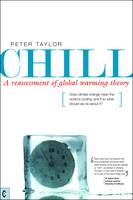
Chill, A Reassessment of Global Warming Theory
Clairview Books (Verlag)
978-1-905570-19-5 (ISBN)
Although the world's climate has undergone many cyclical changes, the phrase 'climate change' has taken on a sinister meaning, implying catastrophe for humanity, ecology and the environment. We are told that we are responsible for this threat, and that we should act immediately to prevent it. But the apparent scientific consensus over the causes and effects of climate change is not what it appears. "Chill" is a critical survey of the subject by a committed environmentalist and scientist. Based on extensive research, it reveals a disturbing collusion of interests responsible for creating a distorted understanding of changes in global climate. Scientific institutions, basing their work on critically flawed computer simulations and models, have gained influence and funding. In return they have allowed themselves to be directed by the needs of politicians and lobbyists for simple answers, slogans and targets. The resulting policy - a 60 percent reduction of greenhouse-gas emissions by 2050 - would have a huge, almost unimaginable, impact upon landscape, community and biodiversity.
On the basis of his studies of satellite data, cloud cover, ocean and solar cycles, Peter Taylor concludes that the main driver of recent global warming has been an unprecedented combination of natural events. His investigations indicate that the current threat facing humanity is a period of cooling, as the cycle turns, comparable in severity to the Little Ice Age of 1400-1700 AD. The risks of such cooling are potentially greater than global warming and on a more immediate time scale, with the possibility of failing harvests leaving hundreds of millions vulnerable to famine. Drawing on his experience of energy policy and sustainability, Taylor suggests practical steps that should be taken now. He urges a shift away from mistaken policies that attempt to avert inevitable natural changes, to an adaptation to a climate that may turn significantly cooler.
PETER TAYLOR is a science analyst and policy advisor with over 30 years experience as a consultant to environmental NGOs, government departments and agencies, intergovernmental bodies, the European Commission, the European Parliament and the UN. His range of expertise stretches from pollution and accident risk from nuclear operations, chemical pollution of the oceans and atmosphere, wildlife ecology and conservation, to renewable energy strategies and climate change. In addition to his advisory work, he has lectured widely in universities and institutes in Britain, Germany, Sweden, the USA and Japan, influencing the thinking and careers of several leading scientists. After graduating in Natural Sciences at Oxford University (and later returning to study Social Anthropology) he set up and directed the Oxford-based Political Ecology Research Group and pioneered the development of critical scientific review on environmental issues, both in the examination of official policy and in its use as a campaigning tool for legal reforms such as the precautionary principle (he was a leading advocate of this at UN conventions). He has sat on several government commissions and research advisory bodies. From 2000 to 2003 he was a member of the UK Government's National Advisory Group for Community Renewable Energy. In 2000 Taylor set up a new group, Ethos (www.ethos-uk.com), to develop educational programmes using leading-edge computer techniques for visualizing change in the rural landscape. After an extensive review of conservation practice for the British Association of Nature Conservationists, he published Beyond Conservation: a wildland strategy in the spring of 2005, and helped found and organize the Wildland Network for conservationists, foresters and land managers. He is a leading advocate of rewilding policies in nature conservation involving minimal human intervention and the reintroduction of exterminated large mammals, and sits on an advisory group for the management of National Trust and Forestry Commission land in the Lake District. At some time he has been a member of the following professional institutes (reflecting his work and interests at different times): the Institute of Biology, the British Ecological Society, the Society for Radiological Protection, and the International Union of Radio-ecologists (at times on the editorial board of the Journal of Radioecology). During his work on marine pollution and hazardous industries he both critically assessed and utilized computer models of complex marine and atmospheric pathways. He is ideally qualified to review and synthesize climate science across many disciplines, taking a broad and independent view with an unparalleled insight into the workings of science and the evolution of policy behind the scenes of public debate and thus to make recommendations that respect the essentials of social as well as environmental sustainability.
PART ONE: THE SCIENCE Chapter One UNCERTAIN SIGNALS Is there a human imprint? Chapter Two NATURAL CAUSES Part of a pettern Chapter Three SATELLITE DATA Evidence contradicts global warming theory Chapter Four CLOUD COVER Changing patterns can explain the warming Chapter Five OCEANS CYCLES Repeating cycles control cloud cover Chapter Six POLES APART Different patterns in the Arctic and Antarctic Chapter Seven THE SOLAR SOURCE The variable sun creates cycles Chapter Eight COSMIC RAYS The missing link? Chapter Nine NEW THEORY An alternative explanation of 20th century warming Chapter Ten PREDICTION The next fifty years: global cooling? PART TWO: THE POLITICS Chapter Eleven VIRTUAL REALITIES Misled by computer simulation? Chapter Twelve DELUSIONS The hubris of climate prediction Chapter Thirteen COLLUSIONS The development of interests Chapter Fourteen URGENCY & ERROR The futility of fighting inevitable climate change Chapter Fifteen VULNERABILITY & ADAPTATION The necessary creation of resilience Chapter Sixteen REFLECTIONS FROM ANTHROPOLOGY What went wrong with the thinking?
| Erscheint lt. Verlag | 26.5.2009 |
|---|---|
| Zusatzinfo | 29 half-tones |
| Verlagsort | Forest Row |
| Sprache | englisch |
| Maße | 156 x 234 mm |
| Themenwelt | Naturwissenschaften ► Biologie ► Ökologie / Naturschutz |
| ISBN-10 | 1-905570-19-8 / 1905570198 |
| ISBN-13 | 978-1-905570-19-5 / 9781905570195 |
| Zustand | Neuware |
| Haben Sie eine Frage zum Produkt? |
aus dem Bereich


